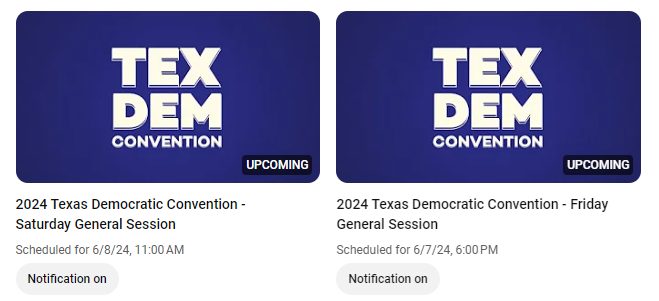Key Rule Changes at the Texas Democratic Party’s 2024 Convention
Building a Better Future: Analyzing the critical rule changes up for debate at the 2024 Texas Democratic Party Convention.
We’re just two days from the highly anticipated Texas Democratic Party’s 2024 Convention. With the Permanent Rules Committee sessions concluded, it’s time to dive into some proposed rule changes that could shape the party’s future.
Earlier this year, the County Conventions laid the groundwork for these rules. They were refined in the Temporary Rules Committee, and now they’ve passed the final stage: the Permanent Rules Committee. The proposed changes will be debated and voted on during the General Sessions this Friday and Saturday. (Mark your calendars; the livestreams are already scheduled!)
While many of the proposed changes are procedural and kind of boring, a few stand out—some are potentially contentious, and one is particularly exciting. Let’s look at the key rule changes that could ignite passionate discussions at this year’s convention.
Adding an Indigenous People’s Caucus.
This shouldn’t be a controversial rule, but it’s the most exciting and long overdue. The history of Indigenous People in Texas spans thousands of years, yet they are one of the least represented demographics in our party and our government.
When colonizers arrived in Texas, several tribes had established territories here, including the Caddo, Karankawa, Coahuitecan, Apache, and Comanche. The arrival of Europeans, beginning with Spanish explorers in the early 16th century, brought significant upheaval. Diseases like smallpox, influenza, and measles decimated Indigenous populations, who had no natural immunity to these foreign illnesses. This period also saw increased conflict and displacement as European settlers and later Mexican and Texan authorities sought to control the land and its resources.
Today, only three federally recognized tribes remain in Texas: the Alabama-Coushatta, Tigua, and Kickapoo. There is also the state-recognized Lipan Apache Tribe of Texas. As of 2024, the Indigenous population in Texas is approximately 370,697, making up about 1.2% of the state’s total population.
By creating an Indigenous People’s Caucus, the Texas Democratic Party is leading the way to restorative justice in Texas. This inclusion ensures that the party’s decision-making processes consider their unique perspectives and needs. The caucus empowers Indigenous members of the party by giving them a formal structure to organize, collaborate, and advance their political goals. It also increases the visibility of Indigenous issues within the party and the broader political landscape of Texas.
It’s a fantastic rule that should garnish tons of support, further solidifying Texas Democrats as the party of ALL people.
Paying the Chair of the Texas Democratic Party.
Paying the Chair of the Texas Democratic Party is a good thing. The proposed amount is $150,000 per year, and it won’t go into effect until after the next Chair election, which is in 2026.
Paying the Texas Democratic Party Chair a salary of $150,000 annually ensures that the role attracts highly qualified candidates who can commit to a full-time position. By providing a competitive wage, the party can set higher expectations and hold the Chair accountable for meeting performance goals. This professionalization of the role aligns with practices in many other states and the Texas Republican Party, fostering competitiveness.
When the Chair position is unpaid, it limits the pool of candidates to those independently wealthy or retired. This exclusionary practice prevents talented individuals from diverse backgrounds from considering the role. By offering a salary, the party opens the position to a broader spectrum of candidates, including those who may have fresh ideas and perspectives but cannot afford to work without compensation.
A salaried Chair can dedicate their full attention to the role’s responsibilities, such as fundraising and strategic planning. This focus is critical for implementing effective strategies to strengthen the party and increase its competitiveness in elections, which we need most in Texas.
This rule is pro-labor, as compensating the Chair fairly recognizes the value and importance of their work. It acknowledges the significant time, effort, and expertise required to lead a major political party in a state like Texas. This ethical decision aligns with the values of equity and fairness, ensuring that the party’s leadership structure does not perpetuate economic disparities.
Chair Hinojosa has stated that he will not run again in 2026. However, even if he does, creating a professional and dedicated paid-chair position will allow highly qualified candidates to run against him.
All in all, I give this rule five stars and would recommend state delegates vote in favor of it if they want to see the Texas Democratic Party achieve future success and effectiveness.
No preference in the primary ballot for Democratic presidential ticket.
This rule generated a lot of discussion because some were worried that it could hurt Democrats in the long run or cause chaos at the National Party Convention. However, we should adopt rules based on what’s best for Texans.
This issue likely arose from what we saw in Michigan this year and the Michigan Democrat’s campaign to undervote in the presidential election by selecting “Uncommitted” on the presidential ballot. They did this to send a message to President Biden regarding their disappointment with how he handled the Gaza situation.
One thing that came up is that many average-day Joe Voters may not know that you can already undervote by just skipping that race and voting for the rest of the down-ballot races. Some Democrats stay home to protest the top of the ticket. In turn, this hurts the primary races down-ballot.
By adding a “No Preference” option to the presidential primary race in Texas, it encourages voters unhappy with the top-of-the-ticket to:
Let leadership know they’re unhappy.
Encourage people to vote still, even when they aren’t happy with the presidential ticket, ensuring the down-ballot races are not neglected.
This rule would not go into effect until 2028, so it has nothing to do with Palestine/Israel and Joe Biden specifically. However, it is forward-thinking that something like this will come up again, maybe in 2028 or 2040.
Think about how many young people we have seen protesting in the streets of Dallas, Houston, Austin, and all over the state in recent months. How many didn’t vote in March because they didn’t feel they had options? A lot. This hurt down-ballot candidates.
In addition, we are supposed to demand change from our elected leaders, and if we are unhappy with them, we reserve the right to let them know. A lot of people, especially establishment people, were angry at Michigan’s campaign, which ultimately got 13% “Uncommitted” Democratic votes. However, this sent a clear-and-cut message to President Biden that 13% of would-be Democratic voters in Michigan were unhappy with his handling of Palestine and he could lose their votes in November.
But guess what? Michigan’s Democratic Primary Election turnout was three times higher than Texas’. Plus, Biden has finally moved on his Ceasefire stance. Whether that was because enough Democratic voters pushed for it or he came around on his own, we probably will never know, but it leaves us wondering if those “Uncommitted” voters were the ones who made that happen.
Again, as this rule wouldn’t go into effect until 2028, it has nothing to do with Gaza or Biden. It’s forward-thinking if a similar situation happens again. I think delegates should support the rule because it gives “The People” a way to express unhappiness with our chosen leader, and turnout for down-ballot races is too important. The rule only adds the “No Preference” option to the presidential ticket, so it doesn’t impact other races.
Annual internal audit by a finance subcommittee.
While this hasn’t been a specific issue I’ve followed closely, I can tell you it has been discussed within Texas Democratic Party circles for a long time. An annual internal audit by a finance subcommittee would promote transparency and accountability within the Texas Democratic Party.
Government transparency and accountability are progressive values. An internal audit of the party’s financial operations ensures that funds are being managed responsibly and ethically. This transparency builds trust among party members and donors and demonstrates integrity and sound financial practices.
This audit should be done internally so the party can avoid more significant financial problems down the line, ensuring the long-term economic health and stability of the Texas Democratic Party. If the party enhances its financial efficiency, more funds can be directed toward critical campaign activities and grassroots organizing efforts.
An internal audit for the party would also foster trust among party officers, the SDEC, and employees. There’s a reason why audits are discussed within Texas Democratic Party circles. The TDP did have a successful audit recently and was scandal-free (assumption since we haven’t heard about any scandal). However, making it a regular process would help with the ongoing efforts to maintain a transparent operation.
These proposed rule changes are significant steps towards inclusivity, professionalism, accountability, and responsiveness.
Stay tuned because the excitement doesn’t stop here. Next, I'll be diving into the Texas Democratic Party's platform and the various resolutions up for discussion. These elements are crucial in shaping the party’s policy direction and priorities, and there are some compelling proposals that could significantly impact our collective future. From healthcare and education to climate change and social justice, the platform and resolutions will define the TDP’s stance on key issues facing Texas today.
154 days left until the November 5 election!
LoneStarLeft’s Newsletter is a reader-supported publication. To receive new posts and support my work, consider becoming a free or paid subscriber.
Follow me on Facebook, Twitter, TikTok, Threads, YouTube, and Instagram.






Ted Cruz votes to allow contraception to be outlawed.
Colin Allred likely to respond with insipid add telling us all how he loves his mother.
CD 12 candidate Trey Hunt won't say anything at all.
Nothing is expected from TDP or TCDP.
U'd think someone could wander to a microphone and condem Cancun Cruz for wanting every white male in Texas to have to worry about impregnating his squeeze....oh and the child support....MFG
Jump all over this D's or simply resign